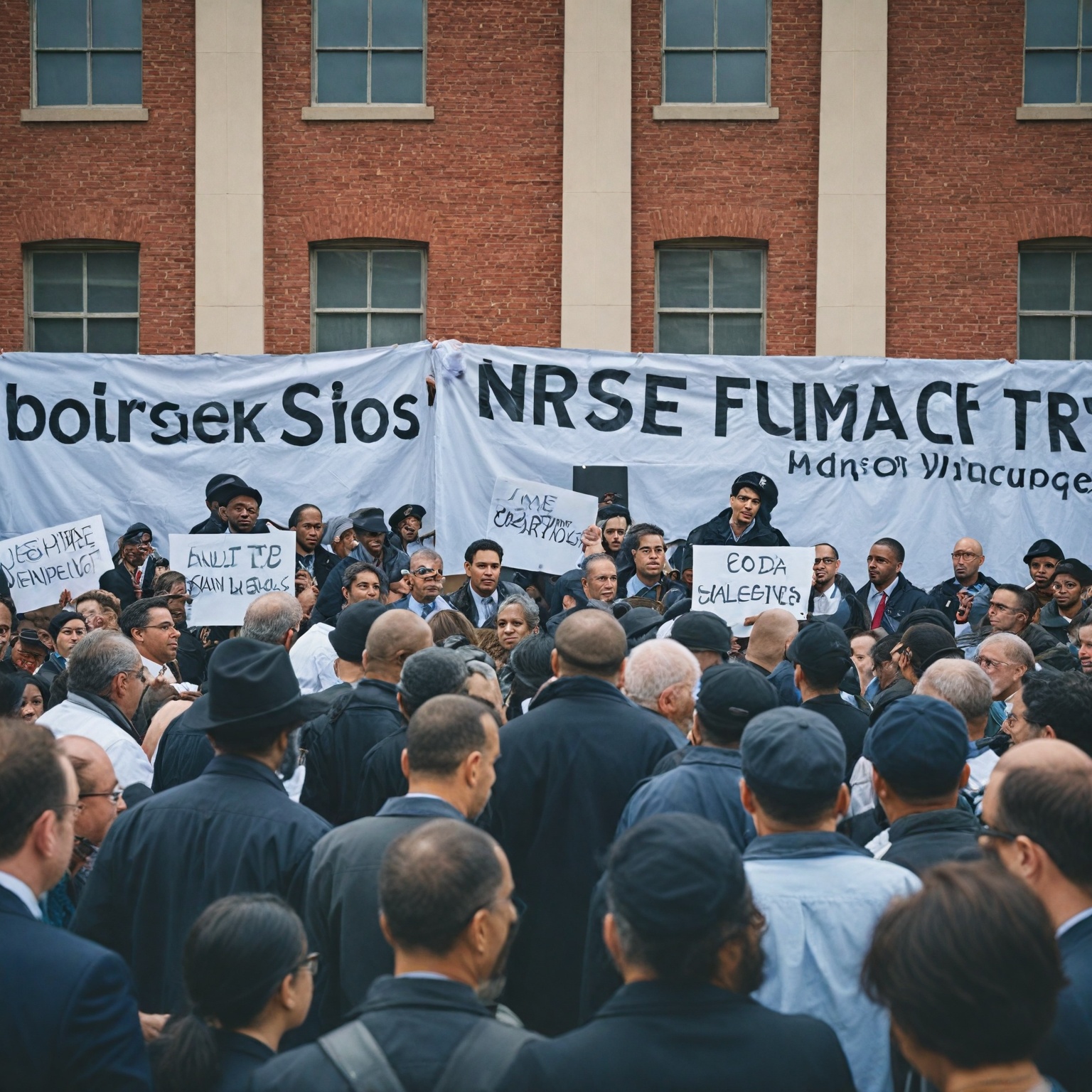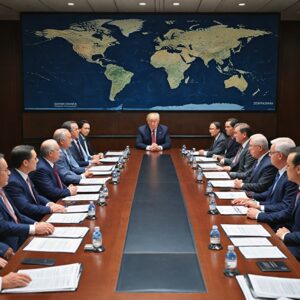Summary
Shocking News Newark Mayor Ras Baraka Accused of Trespassing at New Jersey ICE Detention Center details a controversial incident involving Newark’s mayor, Ras Jua Baraka, who was arrested in May 2025 at the Delaney Hall immigration detention center operated under contract with U.S. Immigration and Customs Enforcement (ICE). Baraka, a prominent progressive leader and vocal critic of federal immigration policies, was visiting the facility alongside members of New Jersey’s congressional delegation to conduct oversight and protest the center’s operation, which he and others argued violated local permits and ordinances. His arrest on trespassing charges ignited a fierce debate over the legal boundaries of elected officials’ access to federal detention sites and the broader conflict between local and federal authorities on immigration enforcement.
Baraka’s tenure as Newark mayor has been marked by progressive reforms addressing crime reduction, housing affordability, and social justice, with a particular focus on opposing what he describes as racially discriminatory immigration policies. The reopening of Delaney Hall in 2021 under a $1 billion, 15-year contract awarded to The Geo Group Inc. drew sustained criticism from Baraka and local activists, who contended the facility operated without adequate city approval and infringed on community rights. The mayor’s attempts to enter the detention center unannounced, culminating in his arrest, underscored ongoing tensions over immigration detention practices and municipal sovereignty.
The incident provoked strong reactions from political figures and the public. Democratic leaders, including New Jersey Governor Phil Murphy and Senator Cory Booker, condemned Baraka’s arrest as an unjust intimidation tactic, while federal authorities defended the enforcement of trespassing laws at secured government facilities. Baraka and accompanying congressional representatives asserted that the arrest was politically motivated and raised critical questions about elected officials’ ability to oversee immigration enforcement and protect immigrant rights. The event has become a flashpoint in national debates over immigration policy, law enforcement jurisdiction, and civil liberties.
Overall, the controversy highlights the complex intersection of local governance, federal immigration enforcement, and legal authority in the United States. Baraka’s arrest brought renewed attention to the operation of ICE detention centers amid broader struggles over immigration reform and the rights of detained migrants, reinforcing Newark’s role as a focal point of activism and political resistance in these contentious issues.
Background
Ras Jua Baraka, born April 9, 1970, is an American politician, author, and educator who has served as the 40th mayor of Newark, New Jersey since 2014. A member of the Democratic Party, Baraka was educated in the Newark Public Schools before earning a Bachelor of Arts degree in Political Science from Howard University and a Master’s Degree in Education Supervision from St. Peter’s University. Throughout his tenure as mayor, he has been recognized nationally for his progressive leadership, focusing on urban revitalization, crime reduction, public safety reform, housing affordability, and income inequality. His administration has achieved significant milestones, including reducing crime to its lowest levels in five decades and replacing all lead service lines in Newark at no cost to residents.
Baraka has been a vocal critic of the Trump administration’s immigration policies, which he has characterized as rooted in white supremacy and racism. His opposition intensified following an immigration raid in Newark that he claimed was conducted by ICE agents without a warrant. In February 2021, ICE awarded a 15-year, $1 billion contract to The Geo Group Inc. to operate the newly reopened immigration detention center in Newark known as Delaney Hall. Baraka responded by suing Geo Group shortly after the contract was announced, aligning himself with local activists and members of Congress who opposed the facility’s operation in Newark.
In his activism against the detention center, Baraka frequently visited Delaney Hall, joining protests alongside Democratic representatives including Bonnie Watson Coleman, LaMonica McIver, and Rob Menendez. These efforts were part of broader calls for oversight and accountability, with officials asserting that the facility opened without proper city permissions and violated local ordinances. Baraka, along with members of Congress, attempted to enter the facility unannounced in a bid to assess conditions firsthand, leading to confrontations with ICE and DHS personnel. The U.S. Department of Homeland Security disputed allegations that the detention center was unpermitted, maintaining that it detains individuals considered high-risk, such as murderers, rapists, and suspected terrorists.
Incident
On a Friday afternoon in early May 2025, Newark Mayor Ras Baraka was arrested at the Delaney Hall detention center in Newark, New Jersey, which had recently begun housing migrants detained by U.S. Immigration and Customs Enforcement (ICE). Baraka was visiting the facility alongside members of New Jersey’s congressional delegation to exercise oversight authority and assess conditions at the newly operational center. According to reports, Baraka was taken into custody after being accused of trespassing and ignoring multiple warnings from Homeland Security Investigations (HSI) to leave the premises.
The incident escalated when ICE agents confronted Baraka and others at the facility. Representative Bonnie Watson Coleman, who was present during the visit, stated that the group had entered and then exited the facility before ICE agents began shoving them, suggesting a contentious interaction. Witnesses described a tense exchange involving Baraka standing within a gated outdoor area of the detention center surrounded by lawmakers and immigration officials. Photographs and videos circulated showing Baraka being handcuffed and escorted away by officers marked with “Police ICE” insignia, with some accounts noting a physical scuffle during the arrest.
Following his detention, Baraka was charged with one count of trespassing and appeared in court the same evening. Interim U.S. Attorney for New Jersey Alina Habba, a former personal attorney to President Donald Trump, publicly condemned Baraka’s actions, emphasizing that he had “willingly chosen to disregard the law” and asserting that “no one is above the law” in the state. In contrast, Democratic leaders across New Jersey, including Governor Phil Murphy and Senator Cory Booker, denounced the arrest as unjust and an infringement on democratic principles, characterizing it as an intimidation tactic rather than legitimate law enforcement.
Baraka himself claimed that the arrest was politically motivated, stating that he had been targeted and was in the public domain at the time of the arrest, not on restricted property as alleged by ICE officials. Congressional members accompanying Baraka, including Senator Bob Menendez and Representative Watson Coleman, supported this view, arguing that the arrest was intended to make an example of the mayor and intimidate public officials engaged in oversight activities. The incident has sparked widespread debate about the use of law enforcement in immigration enforcement settings and the rights of elected officials to conduct oversight at such facilities.
Legal Framework and Proceedings
Trespassing laws in New Jersey establish that a person commits an offense if they knowingly enter or remain in a place without proper license or privilege, especially when notice against trespass has been given. This includes entry into secured structures such as research facilities, utility company property, and restricted areas like immigration detention centers. Under state law, criminal trespassing can also occur if a person was initially invited but later asked to leave and refuses to do so. The legal boundaries are informed by precedents such as *State v. Schmid*, which clarifies that free expression on private property is protected only when it intersects with the nature of the property and public interest, such as local government matters.
Regarding immigration enforcement locations, recent Department of Homeland Security (DHS) guidance permits ICE officers to conduct civil immigration enforcement actions in or near courthouses or other sensitive locations only when there is credible information that the targeted individual will be present, and such actions are not prohibited by local jurisdiction laws. Detention facilities operated or contracted by ICE adhere to strict standards ensuring non-punitive detention and regular oversight to maintain compliance with federal and departmental policies.
In the case of Newark Mayor Ras Baraka, he was arrested and federally charged with trespassing after attempting to visit a new ICE immigrant detention facility in Newark. His entry into the facility without authorization constituted a violation under New Jersey trespassing statutes as it is considered an unlicensed entry into a secured government property. Following his arrest, Baraka asserted that the targeting was politically motivated. The prosecution of Baraka aligns with established legal frameworks for trespassing offenses, particularly in sensitive government locations such as ICE detention centers. The federal charge reflects the enforcement of laws designed to protect such facilities and their operations.
This incident also highlights the tension between local officials opposing immigration enforcement policies and federal authorities enforcing them, underscoring the complex intersection of law enforcement jurisdiction, immigration law, and local governance. The case proceeds under federal jurisdiction, with Magistrate Judge Andre M. overseeing the legal process.
Public and Political Reactions
The arrest of Newark Mayor Ras Baraka at the Delaney Hall immigration detention center provoked widespread public and political response, highlighting deep divisions over immigration enforcement policies and local government authority. Prominent Democratic leaders across New Jersey condemned the arrest, describing it as unjust and an intimidation tactic. Governor Phil Murphy called Baraka’s arrest “unjust,” while State Attorney General Matthew Platkin emphasized that detaining public officials for peaceful protest violates fundamental democratic principles. U.S. Senator Cory Booker labeled the incident “disturbing, unnecessary and indicative of tactics that are undermining the safety and security of our communities, not adding to it”.
Congresswoman Bonnie Watson Coleman, who was present during the incident, accused the Department of Homeland Security (DHS) of deception and excessive force, stating that federal agents began shoving members of the delegation after they exited the facility. She asserted that Baraka was arrested while in a public area, not on ICE property, and described the arrest as a deliberate act to make an example out of the mayor. Other members of New Jersey’s congressional delegation, including Rep. LaMonica McIver and Senator Bob Menendez, were also involved and voiced strong criticism of the federal response.
Local activists and community members rallied in support of Baraka, protesting outside the detention center with chants such as “Let the mayor go!”. The incident intensified debate over the recent reopening of the Delaney Hall facility, which began detaining migrants despite opposition from Newark city officials who argued the center operated without proper permission and in violation of local ordinances. Baraka’s arrest and the subsequent backlash underscored ongoing tensions between municipal leadership and federal immigration authorities, reflecting broader national controversies over immigration enforcement and immigrant rights.
Impact and Aftermath
The arrest of Newark Mayor Ras Baraka at the Delaney Hall ICE detention center sparked significant political and public reactions both locally and nationally. Baraka, a vocal critic of the Trump administration’s immigration policies, was taken into custody after he and several Democratic members of Congress attempted to enter the facility to protest its operation without proper local permits, which they argued violated city ordinances. The incident drew immediate condemnation from Newark officials and immigrant rights activists, who rallied outside the detention center chanting for Baraka’s release.
The confrontation also highlighted broader tensions surrounding ICE’s enforcement practices and the reopening of the Delaney Hall facility. Local and federal authorities clashed over the legality of the detention center’s operation, with the Department of Homeland Security (DHS) denying claims that the facility lacked the necessary permits or inspections, while Newark officials and congressional members accused DHS of disregarding local laws. The episode intensified scrutiny of ICE’s presence in New Jersey, particularly in the context of President Trump’s expansion of detention capacity nationwide, as evidenced by a $1 billion, 15-year contract awarded to The Geo Group Inc. to manage the Newark facility.
Politically, Baraka’s arrest reinforced his position as a prominent opponent of harsh immigration enforcement, drawing increased media attention and public support. He openly condemned the administration’s deportation policies as rooted in racism and white supremacy during subsequent public appearances and debates. The incident also mobilized advocacy groups and elected officials who called for oversight and reform of ICE detention practices, emphasizing the human rights implications of such facilities.
The aftermath saw continued protests at Delaney Hall and heightened dialogue about the role of local governments in regulating federal immigration enforcement actions. Baraka’s detention galvanized a coalition of political figures and activists demanding greater transparency and accountability from ICE, while also spotlighting the complexities of jurisdictional authority in immigration matters. Overall, the event marked a pivotal moment in Newark’s ongoing struggle over immigration policy and local sovereignty.
The content is provided by Blake Sterling, Fact-Nest













